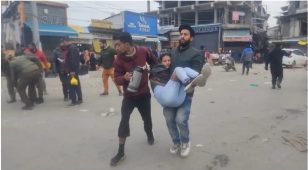Why Railway Connectivity In Jammu And Kashmir Is Such A Challenge hindustantimes.com
The biggest challenges of the Jammu and Kashmir railway projects are geographical. The alignment passes through major geological thrust zones in the region Reasi and Muree, and one major fault Sangaldan.
Union railways minister Piyush Goyal had announced the NDA government’s plans of providing rail connectivity from Kashmir to Kanyakumari by 2022 at the inauguration of the Vande Bharat Express.
Vande Bharat, the train from New Delhi to Katra, is the Centre’s first big infrastructure project in Jammu and Kashmir after the abrogation of Article 370.
The government plan involves a 272-km long rail line from Udhampur to Baramulla joining the Kashmir valley with the railways’ network under Udhampur-Srinagar-Baramulla Rail Link project (USBRL). The 111-km-long railway stretch between Katra and Banihal, currently under construction, will connect the Kashmir Valley with the rest of the country.
Train services have been operational between Banihal and Baramulla in the Valley since 2013. Services on this line connecting Kashmir to Jammu have been suspended since August 5, according to senior railway ministry officials.
“The railway line from Delhi right now goes up only to Katra after that we have a railway line from Banihal to Baramulla. Between Katra to Banihal work is going on and it is the railways’ most challenging project undertaken post-Independence. The alignment of USBRL involves the construction of a large number of tunnels and bridges in highly rugged and mountainous terrain with the most difficult and complex Himalayan geology,” Rajesh Agrawal, Divisional Railway Managers (DRM) Firozpur said.











Leave Your Comment